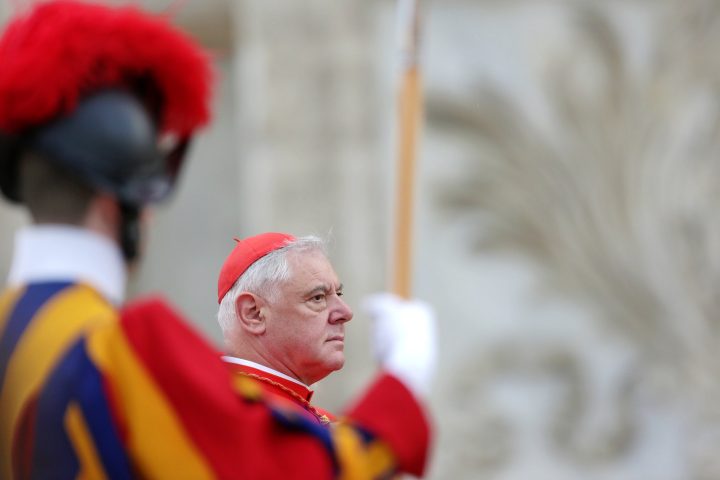Paul Kengor: Trump Reveals Liberal Hearts and Minds
February 15, 2019ARCHIVES: “The Collapse Will Come, Do Not Doubt It”, by Cardinal Sarah
February 15, 2019
The Catholic Herald, 14 February, 2019
In a hyper-partisan era, even appeals to ancient truths are seen as a political gambit
Last Friday, Cardinal Gerhard Müller issued a four-page “Manifesto of Faith” addressing today’s major doctrinal controversies. “In the face of growing confusion about the doctrine of the Faith,” he writes, “many bishops, priests, religious and lay people of the Catholic Church have requested that I make a public testimony about the truth of revelation.”
The text – essentially a gloss on the Catechism of the Catholic Church (CCC) – is intended as a positive proclamation of the Catholic faith. But it gives a negative judgment on the new approach to the Eucharist fostered by Pope Francis. “From the internal logic of the sacrament,” Cardinal Müller argues, “it is understood that civilly remarried divorcees, whose sacramental marriage exists before God, as well as those Christians who are not in full communion with the Catholic Faith and the Church, just as all who are not properly disposed, cannot receive the Holy Eucharist fruitfully (CCC 1457) because it does not bring them to salvation.” Anticipating accusations of harshness, he adds: “To point this out corresponds to the spiritual works of mercy.”
Towards the end of his manifesto, the former prefect of the Congregation for the Doctrine of the Faith (CDF) adopts an apocalyptic tone, similar to that of Archbishop Carlo Maria Viganò in his explosive statements published last year. “To keep silent about these and the other truths of the Faith,” Cardinal Müller writes, “and to teach people accordingly is the greatest deception against which the Catechism vigorously warns. It represents the last trial of the Church and leads man to a religious delusion, ‘the price of their apostasy’ (CCC 675); it is the fraud of Antichrist.”
The response was swift and furious. Cardinal Walter Kasper, who arguably laid the theological groundwork for the new attitude to the Eucharist, said that Cardinal Müller’s manifesto would lead to “confusion and division” because it contained half-truths and made “unacceptable blanket statements”. He suggested that Cardinal Müller was like Martin Luther: “One who rightly advocates reforms in the Church, but wants to pursue these behind the Pope’s back and enforce them in opposition to him.”
There are two things worth noting about this blistering exchange. The first is that the word “confusion” has become weaponised in the Church today. When Cardinal Müller writes in the first sentence of his manifesto about “growing confusion” over doctrine it was difficult to read it as anything other than a criticism of Pope Francis, who has prioritised pastoral care over doctrinal precision since his election in 2013. For Francis’s defenders, the claim of “confusion” is a baseless attempt to discredit the current pontificate. The People of God, they say, realise that Francis is seeking to restore the Gospels’ emphasis on mercy. Cardinal Müller and others like him are therefore the ones sowing confusion by implying that Francis is failing to uphold his role as a guardian of the faith. Besides, they say, there may be a personal element, as Pope Francis conspicuously declined to renew Cardinal Müller’s term at the CDF in 2017.
The second point to note is the highly charged language used both by Cardinal Müller and his detractors. As in the secular world, there is a trend within the Church not merely to express disagreement, but to treat one’s opponents as insidious enemies with whom one has nothing in common. Such rhetorical extremism has, sadly, become embedded in the upper echelons of the Church, hardening divisions and making it difficult for bishops to cooperate on critical issues such as the safeguarding of children.
It is, in fact, likely that Cardinal Müller hopes to draw the Church’s warring factions together with his manifesto. He has often lamented the polarisation that has gripped Catholicism since the Second Vatican Council. He believes that Catholics can rediscover unity in the truths of the faith revealed by God and passed on by the Church through the ages. But in a hyper-partisan era, even appeals to ancient truths are seen as a political gambit. Several commentators have claimed that the manifesto is aimed primarily at the cardinals who will pick the next pope. Cardinal Müller, they say, is providing a litmus test for candidates, if not declaring his own candidacy.
What should Catholics do amid this clash of theological heavyweights? We must pray for the combatants, that they will always have the good of the Church in their inmost hearts. We ought to pray also that a fraction of the immense energy spent on internal battles will be directed outwards, towards the evangelisation of our wounded world.







